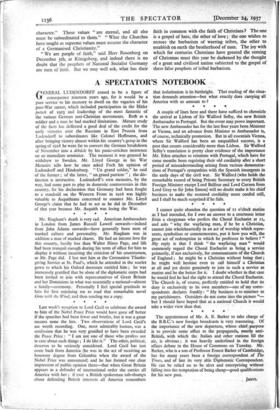A SPECTATOR'S NOTEBOOK
GENERAL LUDENDORFF ceased to be a figure of consequence nineteen years ago, for it would be a poor service to his memory to dwell on the vagaries of his post-War career, which included participation in the Hitler putsch of 1923 and leadership of the most fantastic of the various German anti-Christian movements. Both as a soldier and a man he had marked limitations. Mature study of the facts has deflected a good deal of the credit for the early victories over the Russians in East Prussia from Ludendorff to subordinates like Colonel Hoffmann, and after bringing victory almost within his country's grasp in the spring of 1918 he went far to convert the German breakdown of November into a debckle by his panic-stricken insistence on an immediate armistice. The moment it was granted he withdrew to Sweden. Mr. Lloyd George in his War Memoirs tells how he once asked Foch his opinion of Ludendorff and Hindenburg. " Un grand soldat," he said of the former ; of the latter, " un grand patriote " ; the dis- tinction is instructive. Ludendorff's own memoirs, by the way, had some part to play in domestic controversies in this country, for his declaration that Germany had been fought , to a standstill on the Western Front in 1916 was highly valuable to Asquithians concerned to counter Mr. Lloyd George's claim that he had to act as he did in December of that year because Mr. Asquith was losing the War.
* * * *


































 Previous page
Previous page